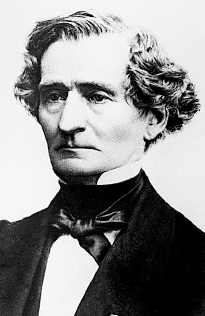Biography
Hector Berlioz (1803–1869)

No other great composer has survived so unpromising a beginning to reach so unhappy an end as Hector Berlioz. Berlioz grew up in a country village in France and received a spotty musical education; he played the guitar and the flute, and as a hypersensitive child learned as much from reading books and scores as from his teachers. His father, a doctor, sent him to medical school in Paris. But, as Berlioz told it, he was so horrified when he got to the dissecting room, where rats were nibbling at the scraps, that he leaped out of the window and went to the Paris Conservatory of Music instead.
The anecdote is typical of his emotional and utterly Romantic personality. Berlioz thought the unthinkable in music; his grandiose program symphonies had simply no precedent and were not matched in ambition until the time of Gustav Mahler, about 1900. His imagination for orchestral tone color was extraordinary.
Like all other Romantic composers, he was inspired by literary models, including especially Shakespeare — his Lélio is a meditation on Hamlet, and his opera Béatrice et Bénédict is taken from Much Ado about Nothing — and Virgil. The Trojans (1858), his huge two-
Berlioz had two wretched marriages, the first to the Irish Shakespearean actress Harriet Smithson, who is immortalized as the idée fixe in the Fantastic Symphony. In spite of suffering from constant ridicule from the musical establishment on the one hand, and terrible health on the other, Berlioz managed through sheer force of his impetuous personality to get most of his enormous compositions performed and to gain a good measure of recognition in musically conservative Paris.
Throughout his life, he was obliged to support himself with musical journalism, at which he was a master; his Memoirs is one of the most delightful books ever written about music. One of the first great conductors, Berlioz toured extensively to promote his own music, especially in Germany, where he was welcomed in progressive circles.
His last years were spent in physical pain and depression. During this time he dragged himself to Russia for conducting gigs — he said his pain stopped when he was on the podium. After 1862 he listened to little music and composed none. Berlioz died in Paris in 1869.
Chief Works: Program symphonies: Fantastic Symphony, Harold in Italy, Romeo and Juliet ◼ Concert overtures: The Corsair, The Roman Carnival ◼ Operas: Benvenuto Cellini, The Trojans (after Virgil’s Aeneid) ◼ Oratorios: The Damnation of Faust, The Childhood of Christ ◼ A great Requiem Mass for orchestra, chorus, and four brass bands
Encore: After the whole Fantastic Symphony, listen to the program symphony Harold in Italy and the overture The Corsair. Read the Memoirs.
Image credit: Hulton-